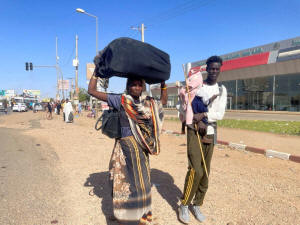|
Residents of the capital Khartoum reported heavy gunfire on
Thursday as many tried to flee a city that has been virtually
paralyzed by fierce battles between the army and the
paramilitary Rapid Support Forces (RSF).
"We call on all parties to implement a sustained humanitarian
pause as soon as possible so that those trapped by the fighting
can seek refuge," Ahmed Al-Mandhari, WHO Regional Director for
the Eastern Mediterranean, told a virtual news conference.
He said such a humanitarian pause was essential for civilians to
access food, water and medicines, and for injured people to seek
medical care.
Both sides had previously said they would respect a 24-hour
ceasefire that was due to come into effect at 1600 GMT on
Wednesday but was quickly broken by clashes.
Mandhari said that humanitarian passage should be created to
allow for health workers, patients and ambulances to move
safely.
Richard Brennan, WHO Regional Emergency Director, said medically
evacuating those severely injured in Sudan was "not a realistic
option right now" due to the grave security situation.
"It's just not possible to have that kind of movement," he said.
"We also have very limited resources. It's very expensive to do
medical evacuations. We are much better off using our limited
resources to shore up the hospitals and support the medical
staff in the country."
Brennan added that the WHO planned to bring more medical
equipment, including emergency surgery kits, into Sudan as soon
as the situation allows.
(Reporting by Gabrielle Tétrault-Farber, Jana Choukeir and Ahmed
Elimam in Dubai; Editing by Gareth Jones)
[© 2023 Thomson Reuters. All rights
reserved.]
Copyright 2022 Reuters. All rights reserved. This material may
not be published, broadcast, rewritten or redistributed.
Thompson Reuters is solely responsible for this content.

|
|



